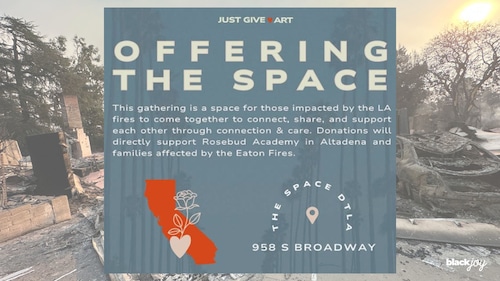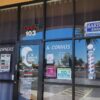Decades-old homes, schools and businesses aren’t all that was destroyed during the California wildfires earlier this month.
The mental wellbeing of thousands of displaced families was also impacted by the climate-change-fueled natural disaster that’s whipping through parts of Los Angeles and Pasadena, Calif. Which is why a collective of wellness practitioners from the area have organized “Offering The Space,” an event to soothe the souls of those who’ve lost both property and peace.
On Sunday at The Space DTLA, wildfire victims will experience one-on-one counseling, yoga, breathwork and several other healing modalities from 1 p.m. until 5 p.m. PST. Spoken-word poetry, free food and art therapy will give attendants the opportunity to express their truth and nourish their souls. While this is a free event, organizers are accepting donations for those affected by the wildfires and Pasadena Rosebud Academy. Educators at the charter school in the historic Altadena area used learning as a community-building tool for their Black and Brown students. Flames consumed Rosebud and hundreds of Black-owned residences during the Eaton Fire, which is now the most devastating wildfire in southern California history.
Philadelphia contemporary artist Al-Baseer Holly will be auctioning his latest painting “When the Smoke Clears” to raise money. The artpiece features a Black child holding a stuffed animal while a fire burns in the background. Holly, who called Los Angeles home for 17 years, said he feels for the children who are wrestling with so much uncertainty right now.
“This piece symbolizes everything that was lost in this crazy fire that’s still burning at the moment, but also is a symbol of resilience,” Holly said on Instagram. “Hearing people’s stories during this time and seeing how optimistic everyone is about starting over has been extremely inspiring.”

Anjëlika Perry, who grew up in Altadena and was a student aide at Rosebud for about four years, started coordinating the event after losing her grandmother’s home to the Eaton Fire. Perry’s grandmother was a single Black mother of four when she bought the house during the 1950s. Now a dwelling that has sheltered four generations is gone.
While Perry was processing her grief, she started receiving messages from Black women asking how they can help. This sisterhood involved therapists and sound healers in the area. Perry also engages in her own form of communal healing through her nonprofit Just Give Art, which uses creative experiences to empower the mental wellbeing of underserved communities across the globe. This abundance of knowledge inspired Perry to gather all the women in a group chat. Together they brainstormed about an event that uses all of their talents to improve the wellness of a city that’s enduring a moment of wreckage.
“We’ve been saying for decades that the key to movement in general is organization,” Perry said. “We’re collectively bringing people with different strengths together to say, ‘Alright, this person does this part. These are their skills. How can we come together to build better?’ So that’s a form of resourcing. So I really believe in that power to start looking at resources differently and saying, instead of financial resources, as great as it is and helpful, it’s not the only way to take care of our community.
Multiple forms of mutual aid – from financial support, to meal trains and clothing drives – are flooding into Southern California since multiple wildfires flared up on Jan. 7th. The two largest blazes, the Eaton Fire and the Palisades Fire, have collectively claimed at least 28 lives and more than 37,400 acres as of Wednesday. Just when firefighters were increasing the containment of the Eaton and Palisades Fires, another blaze erupted in north Los Angeles on Wednesday triggering the evacuation of about 31,000 people. On Wednesday afternoon, the recent Hughes Fire had whipped through 80 acres – a total that swelled to more than 9,200 acres by the evening hours.
The devastation marks a long road of recovery for Los Angeles and its neighbors. Perry believes mental health needs to be an essential part of relief efforts. There are a lot of steps when it comes to protecting one’s property from real estate investors who wish to buy up distressed homes. Perry and her friends are protecting the cultural heritage of Altadena by inviting locals to a space that cares for their mental wellbeing. An improved mental health leaves space for more energy to tackle big tasks, such as contacting mortgage companies or applying for federal aid.
“It’s very much my intention to do something that takes care of mental health right now and that we’re not hardened by this because a lot of things can get missed when you’re trying to make sure a legacy is preserved and having to rebuild at the same time,” Perry said. “My mother used to always tell me, ‘You can’t think straight if you’re in panic mode.’ It’s something you have to exercise when you find yourself overwhelmed and you’re trying to figure it all out.”
Perry has a reason to worry. The displacement of families caused by natural and man-made disasters is part of an emotional wound that throbs throughout generations of Black people. Tiffany Storey, a licensed professional counselor in Birmingham, Ala., recalled the devastation of Hurricane Katrina in 2005. Prior to the storm, lower-income New Orleanians were already buckling under the weight of rising housing costs. Floodwaters swallowed up more than 80 percent of the city after poorly built and inadequately maintained levees broke during Katrina.
More than 400,000 residents were uprooted from their homes, which created the conditions for gentrification to occur. Locals were priced out as housing costs increased. According to the National Community Reinvestment Coalitions Gentrification and Disinvestment report in 2020, Black neighborhoods like Tremé and Central City were affected by gentrification.
Storey isn’t affiliated with the event, but she was born in Los Angeles and has family in an area that still captivates her heart. She’s aware of how hard it is to find a home in one of the least affordable housing markets in the country. The average rent for all properties in Los Angeles is $2,783, which is 39 percent higher than the national average.
Black people experienced more intense and persistent forms of mental illness due to systemic racism. A natural disaster amplifies this pain.
“There’s a lot of intergenerational trauma that comes with being displaced,” Storey said. “When you’re dealing with a community of people who encounter trauma and oppression in their everyday life, I don’t think we understand just how far-reaching the impact of that trauma is on their mental and emotional wellness. It can have an impact from generation to generation.”
Obtaining resources in a space that builds familiarity can help break down that trauma, Storey believes. Churches, schools or other community-centered areas are examples of places where victims can rebuild their lives while working with people who look like them.
“They’re not talking to some governmental entity that they have to be worried about if they have some type of criminal history. If they have some type of history of mental illness, they don’t have to worry about the fear of rejection which just makes mental distress, grief, sadness or anxiety worse,” Storey said. “So communal care is really a critical need for communities to be able to grow and recover because people want to be able to connect with resources and organizations that culturally identify with them.”
During a moment of so much loss, finding a way to process that grief together can help wildfire victims find a sense of home and comfort within each other. This type of connection transforms collective grief into communal healing, Storey said.
“Anytime you go through something major and you’re experiencing some type of loss or injury, it can feel very lonely,” Storey said. “So just being able to have access to people in the community to serve as a resource of support in itself does a lot. It’s motivating for you to see someone else overcoming it all.”
Perry hopes the “Offering of Space” event will give her community a chance to release and breathe. Carrying the stress of the wildfires can be harmful and lead to a lack of sleep and loss of appetite, Perry said. Instead of using their bodies as reservoirs of pain, she wants them to open themselves up to joy by sharing what they want and need.
“There’s a lot of vulnerability in our joy,” Perry said. “It takes a lot to laugh right now. It takes a lot to let people be there for you. if you can be vulnerable with people, they will love you, and that love is going to inspire you to keep that hope alive.”


